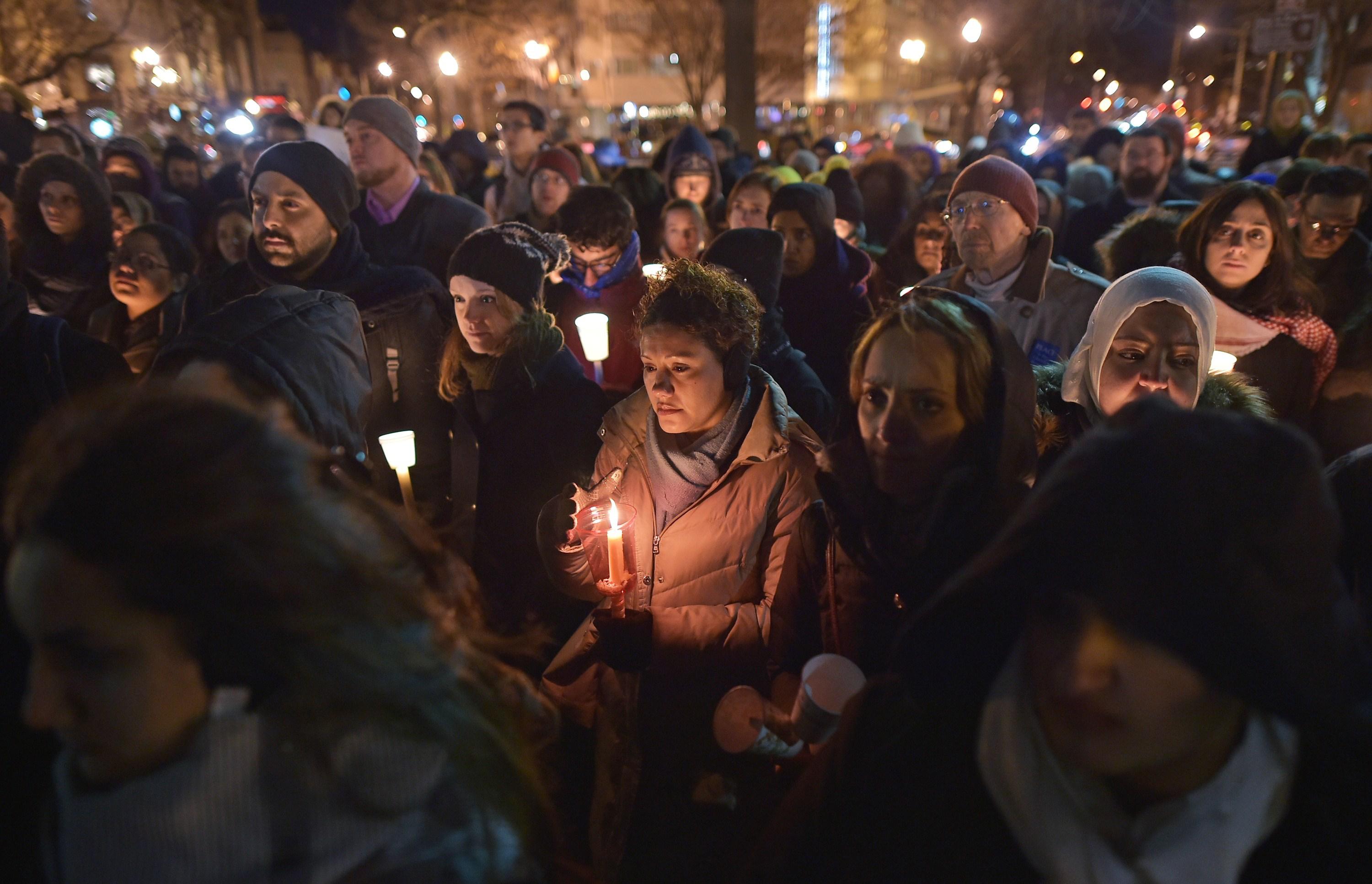The FBI announced on Thursday that it has launched an investigation into this week’s triple-homicide in Chapel Hill, N.C. The local police there say the slayings of three Muslim-American students were likely the result of the suspected killer’s rage over an ongoing parking dispute. The family of the victims, meanwhile, says that the alleged shooter—a 46-year-old white man and critic of organized religion named Craig Stephen Hicks—clearly targeted his victims because of their faith. “This has hate crime written all over it,” Mohammad Abu-Salha, the father of the two female victims, declared at their funeral.
The information we do have is very much incomplete. Additional details will almost certainly come to light between now and when officials make a final decision on whether or not to pursue hate-crime charges. Even when we do know more, there’s no guarantee we’ll know better. Hicks’ true motivation may ultimately prove unknowable. Still, with Muslim groups joining the victims’ family in urging officials to investigate the killings as a hate crime—and with global outrage over the murders (and the response to them) taking the form of the popular Twitter hashtag #muslimlivesmatter—it’s worth examining how any hate crime charges might proceed.
If the prosecution does attempt to seek such charges, they’ll have their work cut out for them. Proving Hicks is biased against Muslims wouldn’t be enough to prove beyond a reasonable doubt that he killed the three victims because of that bias. “The difficulty of these cases is that you have to get inside the defendant’s head and show motive,” Kami Chavis Simmons, a former federal prosecutor who is now the director of Wake Forest University’s criminal justice program, told me. “With a typical hate crime, the person goes out looking for a victim who is in one these protected classes… and even then [prosecutors] face a very high burden.”
Here’s what we know for sure about the crime and Hicks’ possible motives: We know that 21-year-old Yusor Mohammad Abu-Salha, her 23-year-old husband, Deah Shaddy Barakat, and her 19-year-old sister, Razan Mohammad Abu-Salha were shot and killed Tuesday in the apartment complex where the newlyweds lived. While Hicks has not pleaded guilty, he turned himself in and is said to be cooperating with police. We also know that Hicks has been outspoken in his criticism of religion—as the New York Times puts it, his Facebook “page is filled with posts and cartoons mocking the intelligence of people who believe in the Bible”—but that he also routinely clashed with neighbors over parking and other petty squabbles. “I have seen and heard him be very unfriendly to a lot of people in this community,” Samantha Maness, a resident of the apartment complex, told the Times. She described Hicks as displaying “equal opportunity anger” and said “he kind of made everyone feel uncomfortable and unsafe.” Other neighbors have told similar stories. The women’s father, meanwhile, said that one of his daughters had told him that Hicks had previously harassed her about her appearance.
So two competing narratives have clearly emerged. But investigators don’t necessarily have to choose between the two possible motives. North Carolina’s hate-crime statue requires only that the crime in question was committed “because of” the victim’s race, religion, nationality, or country of origin. The FBI’s threshold, meanwhile, is simply a traditional offense “with an added element of bias.” As CNN legal analyst Sunny Hostin put it, “all that matters is that the crime was motivated, in whole or in part, by the offender’s bias.”
It would be possible, then, for police to conclude that Hicks confronted the three victims about parking but in the end was motivated—in part or in whole—to kill them because they were Muslim or of Arab descent. Alternatively, they could decide that the victims’s faith was what prompted Hicks to confront them in the first place. Investigators could ultimately pursue hate-crime charges against Hicks without abandoning their preliminary findings about the origins of the dispute. The two narratives we have aren’t mutually exclusive.
Making matters more complicated for investigators is the fact that Hicks’ online criticism of religion appears to have been directed at a number of different faiths, not just Islam. There’s also the matter of what Hicks’ neighbor described as his “equal-opportunity anger” around the apartment complex. That could complicate any potential bid to convince a jury that Hicks was driven by bias as opposed to more general rage. Still, it doesn’t rule hate out. “Someone can be an equal-opportunity bad person,” says Simmons, “but if they are doing something in this one instance because [the victims] are Muslim … you can still have a hate crime.”
To date, neither state nor federal officials have suggested they believe the murders were religiously motivated, but they haven’t ruled it out, either. Even without hate-crime charges, though, Hicks faces three counts of first-degree murder and, if convicted, could be eligible for the death penalty or a life sentence without parole.
